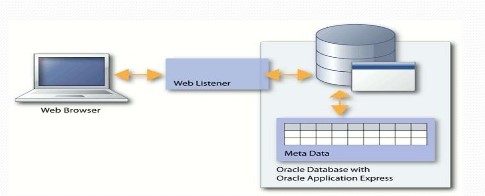The Application Express engine renders applications in real time from data stored in database tables.
When we create or extend an application, Oracle Application Express creates or modifies metadata stored in database tables.
When the application is run, the Application Express engine then reads the metadata and displays the application.
Application Express lives completely within Oracle database.
It is comprised of nothing more than data in tables and large amounts of PL/SQL code.
The essence of Oracle Application Express is approximately 215 tables and 200 PL/SQL objects containing 300,000+ lines of code.
When we create or extend an application, Oracle Application Express creates or modifies metadata stored in database tables.
When the application is run, the Application Express engine then reads the metadata and displays the application.
Application Express lives completely within Oracle database.
It is comprised of nothing more than data in tables and large amounts of PL/SQL code.
The essence of Oracle Application Express is approximately 215 tables and 200 PL/SQL objects containing 300,000+ lines of code.
 |
| Architecture of Oracle APEX |
In addition to an Oracle Database the Oracle Application Express architecture requires some form of Web server to proxy requests between a Web browser and the Oracle Application Express engine. There are three options for configuring the web server:
1. Oracle HTTP Server with mod_plsql.
2. Embedded PL/SQL Gateway (EPG).
3. Oracle Application Express Listener.
Oracle HTTP Server
The Oracle HTTP Server (Oracles web server) is based on the Apache web server.
Oracle introduced a module to the Oracle HTTP Server called mod_plsql which allows requests to execute PL/SQL code to be passed via a URL to the Oracle database for processing.
Embedded PL/SQL Gateway
Starting with Oracle Database 10gXE , you can use the embedded PL/SQL gateway.
The embedded PL/SQL gateway is installed with Oracle Database 11g and does not require the Oracle HTTP Server. It provides the Oracle Database with a web server and the necessary infrastructure to create dynamic applications. The embedded PL/SQL gateway runs in the Oracle XML DB HTTP Server in the Oracle Database. It includes the core features of mod_plsql.
Oracle Application Express Listener
Oracle Application Express Listener is a Java-based interface that communicates directly with the APEX engine, thus eliminating the need for mod_plsql.
It can be installed in a J2EE application server or can be installed in stand-alone mode. The use of the Oracle APEX listener simplifies the deployment process because there is no Oracle home required as connectivity is provided using an embedded JDBC driver. The J2EE implementation offers increased functionality including a web based configuration, enhanced security, and file caching.
The APEX Listener also provides flexibility by supporting deployments using Oracle Web Logic Server (WLS), Oracle Glassfish Server and OC4J.
No comments:
Post a Comment